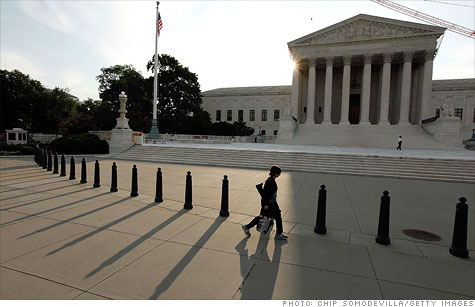Search News

Unless the Supreme Court strikes down the entire health reform law, it's likely many of the law's revenue raisers will stand -- including the Medicare tax increase on high-income households.
NEW YORK (CNNMoney) -- No one knows for sure what the Supreme Court will do with health care reform. But unless it strikes down the whole law, millions of wealthy families can expect a tax increase come January.
Two big Medicare tax changes were enacted to help pay for the new federal subsidies that millions of Americans will get when they buy health insurance. The tax changes themselves were not among the specific provisions of the law being challenged at the court.
The new increases in Medicare taxes will apply to individuals making more than $200,000 a year, or $250,000 for married couples.
The measure, set to go into effect next year, is estimated to raise more than $200 billion over 10 years.
Roughly 4 million households -- or 2.4% -- will be affected by the increase initially, according to new estimates from the Tax Policy Center. By 2022 that number will grow to 8.3 million, or 4.6%.
How much more households will pay depends on which Medicare increase they'll be subject to since the Affordable Care Act calls for two changes. Some households will only be subject to one, and some will be subject to both.
The first involves the Medicare tax on earnings. Today, workers pay 1.45% of their wages into Medicare. Starting next year, high-income individuals will pay another 0.9 percentage points on their earned income over $200,000 ($250,000 if married).
The second change pertains to investment income, which to date has never been subject to the Medicare tax. But next year high-income households will start paying a 3.8% tax on at least a portion of their investment income, such as capital gains, dividends and rental income.
Households subject only to the Medicare tax increase on earnings will pay an estimated $2,430 more on average next year. But amounts vary widely depending on one's income level. Those making between $200,000 and $500,000, for instance, will only pay about $633 extra while households making $1 million or more would pay another $11,242.
By contrast, millionaires subject only to the new investment income tax will see a much bigger tax bill, paying $38,149 more.
And -- no surprise -- households subject to both versions of the Medicare tax increase will get hit the hardest. More than 90% of those with incomes over $1 million fall into this group, according to Tax Policy Center estimates. And their average tax increase would top $45,000 next year. By 2022, they'll pay $57,125 more.
While it's easy to make the case that the wealthy can absorb these kinds of increases without much strain, that argument may not hold up as well over time as lawmakers seek to raise more revenue from the $250,000-and-up crowd to pay for any number of endeavors, including reducing deficits.
Said Tax Policy Center senior fellow Roberton Williams: "The well is only so deep." ![]()

Carlos Rodriguez is trying to rid himself of $15,000 in credit card debt, while paying his mortgage and saving for his son's college education.
| Overnight Avg Rate | Latest | Change | Last Week |
|---|---|---|---|
| 30 yr fixed | 3.80% | 3.88% | |
| 15 yr fixed | 3.20% | 3.23% | |
| 5/1 ARM | 3.84% | 3.88% | |
| 30 yr refi | 3.82% | 3.93% | |
| 15 yr refi | 3.20% | 3.23% |
Today's featured rates: